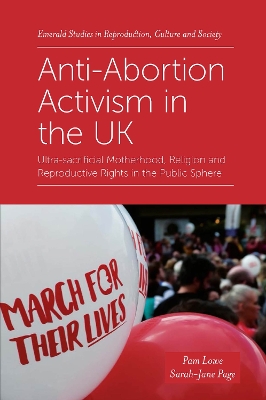Emerald Studies in Reproduction, Culture and Society
1 total work
Drawing from extensive ethnographic research on abortion debates in public spaces, this book explores the beliefs, motivations and practices of UK anti-abortion activists. Whilst they represent a tiny minority, there is recent evidence of an increase in activism outside UK abortion clinics; faith-based groups regularly organise 'vigils' seeking to deter service users from entering clinics. In response to this, pro-choice groups launched a campaign for buffer-zones around clinics. Although there is overwhelming public support for abortion, it remains an area of public contestation that touches on ideas about bodily autonomy, religious freedom and reproductive rights. Despite being active in the UK since before the 1967 Abortion Act, anti-abortion activism has received little attention.
Taking a lived religion approach, Anti-Abortion Activism in the UK explores the sacred and profane commitments of anti-abortion activists and counter-demonstrations outside clinics, examining the contestations over space. The authors argue that as a moral reform social movement, the anti-abortion activists typically frame their activism in terms of risk and abortion harm, but their religiously-informed understanding of ultra-sacrificial motherhood as ‘natural’ for women undermines this framing. Their conservative gender and sexuality attitudes position them culturally as a moral minority. The displays of public religion are also anomalous in a country in which religion is usually seen as a private issue. Their presence outside abortion clinics causes a significant amount of distress, but public support for the establishment of safe zones outside of abortion-service provision is strong and is a proportionate response to safeguard the freedoms of those seeking abortion.
